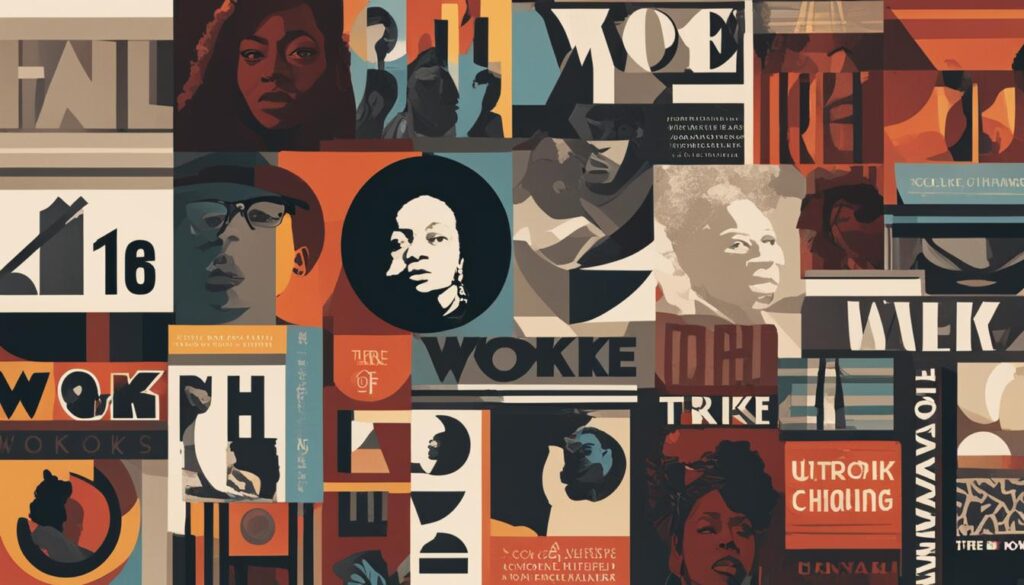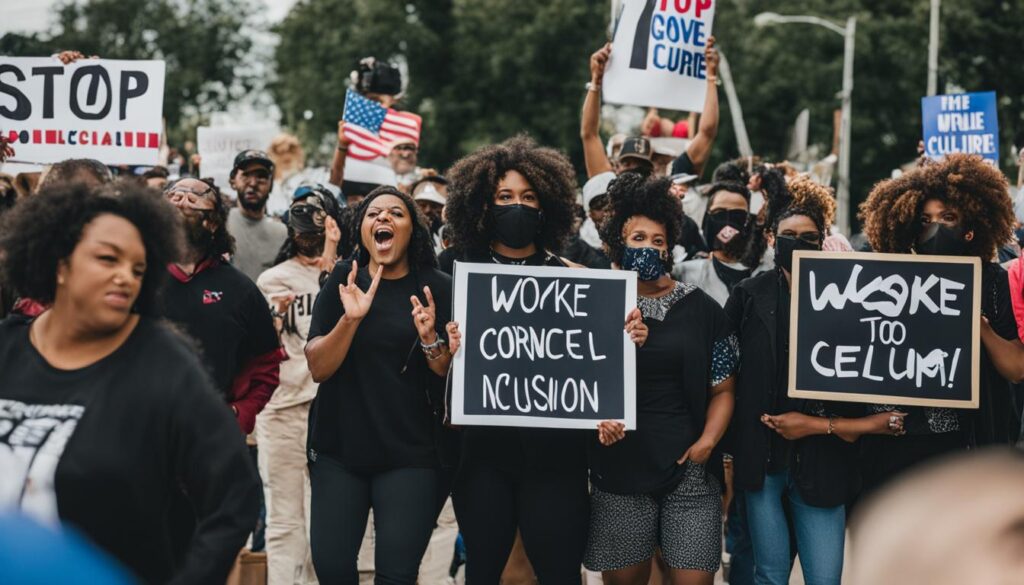**Did you know** that “**woke**” first came from Black communities and social justice movements? It meant **being aware** of inequality. But as time passed, more people started using it. Now, **woke** has a broader meaning and people argue about what it really signifies.
Woke culture, at its core, represents a call for political consciousness and a recognition of systemic injustices. However, its true meaning and significance are often misunderstood or misrepresented. In this article, we delve into the history, controversies, and political implications surrounding woke culture to help clarify its true essence.
Key Takeaways:
- Woke culture originated within Black communities and social justice movements as an awareness of inequality.
- The term gained mainstream popularity during the Black Lives Matter movement in the early 2010s.
- Some argue that woke culture has been co-opted and diluted in meaning by white liberals.
- Conservatives have criticized woke culture, viewing it as an attack on traditional values and an excessive focus on identity politics.
- Understanding the true meaning of woke culture requires examining its historical significance, controversies, and political implications.
The History of Woke
The term “woke” has a long history that dates back to the early 20th century. It originated within Black communities as a call for awareness and vigilance against racial inequality. The term gained popularity during the Black Lives Matter movement in 2014, following the tragic police killing of Michael Brown in Ferguson, Missouri. The widespread protests and activism that ensued brought the term “woke” into the mainstream consciousness, sparking a broader conversation about social justice and systemic racism.
Early usage of “woke” can be found in Black protest songs, such as Lead Belly’s 1938 song “Scottsboro Boys.” These songs served as powerful tools to mobilize the Black community and emphasize the importance of staying awake and alert to the ongoing threats of racism. Through this musical expression, the term “woke” became a symbol of resistance, resilience, and the fight against injustice.
“Woke” found its roots in the struggles of Black Americans, with artists using the term to encourage a collective consciousness and understanding of the oppressive forces they faced.
However, it was during the Black Lives Matter movement that “woke” truly entered the cultural lexicon. The movement brought attention to systemic racism and pushed for reform in law enforcement practices. As activists rallied for justice and equality, they embraced the term “woke” as a powerful declaration of their commitment to challenging social norms and advocating for marginalized communities.

The history of “woke” demonstrates its roots in the struggle against racial injustice and the quest for equality. By understanding the origins of the term, we can gain deeper insights into the social and cultural context in which it emerged. The next section will explore the co-opting of “woke” and how its meaning has been distorted in recent years.
Co-opting of Woke
Critics have raised concerns about the co-opting of the term “woke” by white liberals and its performative use to project a progressive image. This phenomenon has led to dilution of the term’s original meaning and the undermining of the social justice movement it emerged from.
“Performative woke” refers to individuals who adopt the language and ideas associated with social justice without actively engaging in meaningful action or addressing systemic issues.”
The co-opting of “woke” extends beyond the United States, with its pejorative use gaining traction in other countries as well. This trend has far-reaching implications for discussions surrounding social justice and equality.
The Impact of Performative Woke
The performative use of “woke” has sparked debate within activist communities. Some argue that it creates a false sense of progress, diverting attention from the need for tangible change. Others believe that the growing popularity of the term has resulted in increased awareness and dialogue around important issues.
- Performative woke: Detracts from genuine activism and social change efforts.
- Co-opted term: Challenges the authenticity and credibility of individuals claiming to be “woke”.
It is important to acknowledge that there are individuals who genuinely engage with the principles of social justice and demonstrate their commitment through meaningful action. However, the concern lies in those who co-opt the term for personal gain or to bolster their public image.
The Power of Authenticity
True progress in addressing social injustices comes from genuine efforts, rooted in a deep understanding of the issues at hand. Authentic allyship and activism require active learning, self-reflection, and consistent action.
“Performative woke has the potential to perpetuate the very systems of oppression it seeks to challenge by distracting from substantive change and enabling complacency.”
By shedding light on the co-opting of “woke”, there is an opportunity to reclaim its original purpose and refocus conversations on tangible solutions. This involves amplifying the voices of marginalized communities and confronting the systemic issues that perpetuate inequality.

Conservative Definition of Woke
Conservative definitions of woke vary, but many describe it as a form of cultural Marxism, positioning it as a threat to society. Prominent politicians like Ron DeSantis and Nikki Haley have used the term in a negative way, associating it with left-leaning positions such as LGBTQ+ rights and the teaching of race in schools.
“The woke ideology is an attack on our traditional values and threatens the fabric of our society.” – Ron DeSantis
Conservatives argue that the concept of being woke promotes identity politics and deemphasizes individual merit. They view it as a dangerous ideology that undermines the principles of personal responsibility and limited government.
The Link to Cultural Marxism
One specific conservative critique of woke culture is its alleged connection to cultural Marxism. Cultural Marxism refers to a theory that suggests Marxist ideas and tactics have shifted to cultural issues, such as gender, race, and class. Some conservatives believe that the push for social justice and inclusivity, which is associated with being woke, is an extension of this broader cultural Marxist agenda.
In their view, the emphasis on systemic inequality and the need to dismantle oppressive structures is a subversion of traditional American values. These critics argue that being woke promotes a victim mentality and encourages a culture of entitlement, leading to division and societal decay.
| Conservative Criticism | Key Points |
|---|---|
| Woke Agenda | Conservatives see the woke movement as an agenda-driven endeavor that seeks to reshape society based on progressive ideals, such as equity and social justice. |
| Political Correctness | They view woke culture as a manifestation of political correctness, stifling free speech, and promoting self-censorship. |
| Identity Politics | Conservatives argue that the focus on identity politics perpetuates division and assigns individuals value based on their group identities rather than their individual merits. |
However, it’s crucial to note that these perspectives on woke culture are not monolithic within conservative circles. Different conservatives may have varying degrees of concern or reject these critiques altogether.

Popularization and Controversy
The conservative redefinition of “woke” has contributed to its widespread popularity in recent years. Google searches for “woke” have reached an all-time high, indicating a growing interest in the term. However, along with its popularization, the term has also sparked controversy.
The Popularity of Woke
The popularization of “woke” can be attributed to various factors. Its association with progressive ideologies and social justice movements has resonated with many individuals who are passionate about equality and fighting systemic injustices. The term has spread across social media platforms, activist circles, and mainstream culture, making it a widely recognized term.
In addition, the use of “woke” as a political epithet by conservative commentators and politicians has also contributed to its popularity. While intended to criticize liberal ideas and policies, this negative framing has inadvertently increased awareness and curiosity about the term among a broader audience.
Controversies Surrounding Woke
Despite its popularity, the term “woke” has faced significant controversy and criticism. Detractors argue that the term has been co-opted and diluted, losing its original meaning rooted in social justice movements. They claim that the popularized use of “woke” has become performative, used to virtue signal rather than drive meaningful change.
Additionally, critics assert that the negative use of “woke” by conservative groups serves to undermine social justice efforts and perpetuate white grievance politics. They argue that this redefinition of the term intentionally misrepresents the goals of the movement, framing it as a threat to traditional values and societal unity.
These controversies have sparked intense debates around the true intentions and impact of “woke” culture, with individuals and communities using the term taking opposing stances on its value and validity.

Despite the controversies surrounding “woke,” it continues to be a term that garners significant attention and discussion in both mainstream and political discourse. Its popularization has led to increased awareness about social justice issues, prompting important conversations about equality and inclusion. However, the complexities and debates surrounding the term make it essential to analyze its nuances and understand the differing perspectives associated with it.
Historical and Cultural Significance
The term “woke” holds both historical and cultural significance, particularly within Black communities. It originated as a powerful call for political consciousness and an awakening to systemic injustices. The term resonated deeply within the African American experience, representing a collective effort to combat racial inequality and fight for social justice.
Throughout history, the term “woke” has been utilized in various forms of activism, including protest songs and social movements. Its roots can be traced back to the early 20th century, when it was used by Black artists and musicians to raise awareness about systemic racism and the ongoing struggle for civil rights.
Indeed, the cultural significance of “woke” extends beyond its historical context. It has come to symbolize a commitment to challenging the status quo and striving for a more equitable society. Today, the term is used to describe individuals who are actively engaged in issues of social justice, addressing systemic inequalities, and working towards positive change.
Woke is more than just a term; it represents an ongoing pursuit of equality and a dedication to dismantling oppressive systems.
The cultural significance of “woke” is evident in the embrace and reappropriation of the term by marginalized communities striving for empowerment and social transformation. By fostering critical consciousness and encouraging dialogue around race, inequality, and activism, “woke” has served as a rallying cry for those seeking to challenge and combat systemic injustices.
To truly understand the significance of “woke,” one must recognize its historical roots, cultural resonance, and ongoing impact on social justice movements.

Conservative Criticism of Woke
Conservative criticism of “woke” culture has been prevalent in recent years, with conservatives expressing their concerns about its impact on society. They argue that “woke” ideology represents an assault on traditional values and an undue emphasis on identity politics. According to conservative critics, the focus on personal identity and systemic oppression promotes division among individuals and communities, undermining the principles of unity and meritocracy.
“The problem with ‘woke’ culture is that it seeks to divide us based on our identities rather than focusing on our shared values and common goals. It promotes a victim mentality and encourages people to view themselves primarily through the lens of their race, gender, or other identity markers. This undermines the pursuit of individual achievement and merit-based opportunities.” – Conservative commentator
Conservatives argue that the prominence of “woke” culture in various aspects of society, such as academia, corporate settings, and media, has led to the suppression of conservative viewpoints and a stifling of intellectual diversity. They maintain that “woke” ideology often silences dissenting opinions, labeling them as “hateful” or “problematic” without allowing for meaningful debate and open exchange of ideas.
Additionally, conservative critics perceive “woke” culture as a form of cultural Marxism. They claim that it aims to undermine the foundations of Western civilization and traditional institutions by pushing for radical societal transformations. This critique suggests that “woke” ideology seeks to dismantle existing power structures and replace them with a new order based on identity-based hierarchies.
The Critique of Woke Culture:
- – “Woke culture promotes a victimhood mentality, perpetuating a narrative of oppressors and victims. This not only undermines personal responsibility but also fosters a culture of blame and entitlement.” – Conservative scholar
- – “The emphasis on intersectionality and ‘privilege’ in woke culture often leads to the dismissal of individual achievements and merit-based opportunities, as they are overshadowed by group identity.” – Conservative commentator
- – “Woke culture fuels cancel culture, where individuals are publicly shamed and ostracized for expressing different opinions or challenging prevailing narratives. This hinders open dialogue and intellectual growth.” – Conservative activist
While conservative criticism of “woke” culture focuses on its perceived negative consequences, it is essential to note that there are varying perspectives within conservative circles. Not all conservatives share the same concerns or adopt a uniformly critical stance towards “woke” ideology.

Despite the conservative criticism surrounding “woke” culture, proponents argue that it plays a vital role in addressing societal inequalities and fostering inclusivity. They maintain that “woke” culture’s aim is to bring attention to systemic issues and advocate for social justice. The ongoing debate between conservatives and proponents of “woke” culture highlights the complex and contentious nature of this ideological divide.
| Conservative Criticisms | Proponents’ Responses |
|---|---|
| Undermines meritocracy and individual achievement | Highlights systemic injustices and aims for equal opportunities |
| Promotes division based on identity | Advocates for inclusivity and representation |
| Suppresses conservative viewpoints | Encourages diverse perspectives and societal progress |
As the cultural and political landscape continues to evolve, it is crucial to engage in thoughtful and respectful discussions that bridge ideological divides and promote understanding.
Political Implications of Woke
The term “woke” has transcended its original meaning within Black communities and has become a significant political issue. Republican candidates have seized upon this term, using it as a pejorative to rally support against progressive policies. The political implications of “woke” extend beyond mere rhetoric, shaping debates and legislation that impact education, diversity programs, and LGBTQ+ rights. As a result, “woke” has become a symbol of the ongoing culture war between conservatives and progressives.
The Impact on Education
One of the key political implications of “woke” is its influence on education. Policies and curriculum related to diversity and inclusion have come under scrutiny, with conservatives arguing that these initiatives are driven by a divisive and politically motivated agenda. Legislation has been proposed in various states to limit the teaching of certain topics deemed “woke” or to prohibit “critical race theory” from being included in educational materials.
Debating Diversity Programs
“Woke” has also had a significant impact on discussions surrounding diversity programs in both public and private sectors. Conservative critics argue that these programs prioritize identity politics over merit and create a culture of victimhood. This perspective has fueled debates over affirmative action policies and diversity hiring practices, with some aiming to dismantle such programs.
Shaping LGBTQ+ Rights Movements
The “woke” ideology has also shaped the ongoing struggle for LGBTQ+ rights. Conservative backlash against the recognition of gender identity, transgender rights, and same-sex marriage has been attributed to the broader political discourse surrounding “woke” culture. The term has become a rallying cry for opponents of LGBTQ+ rights, leading to legal battles, referendums, and contentious discussions regarding the rights of marginalized communities.
The Divide between Conservatives and Progressives
The politicization of “woke” has deepened the divide between conservatives and progressives. The term has become a touchstone for cultural values, with conservatives viewing it as a symbol of liberal excess and identity politics. Meanwhile, progressives argue that “woke” represents a necessary push for social justice and equity. The resulting polarization has fueled political campaigns, social movements, and policy debates.

| Political Implications of Woke | Impact |
|---|---|
| Education | Affected by debates and legislation on diversity teaching and critical race theory |
| Diversity Programs | Controversial discussions on affirmative action and diversity hiring |
| LGBTQ+ Rights | Shape legal battles and debates on gender identity and same-sex marriage |
| Conservative vs. Progressive | Deepens the cultural divide between conservatives and progressives |
Corporate Backlash and Consumer Boycotts
As the concept of “woke” culture gains more visibility, companies that are seen as embracing it have faced corporate backlash from conservative groups. These groups view “woke” culture as a threat to traditional values and an excessive focus on identity politics.
Consumer boycotts have become a common response to companies that openly support LGBTQ+ rights and celebrate diversity. These boycotts are initiated by individuals who feel that these companies are aligning themselves with a specific political ideology, rather than focusing solely on their products or services.
The controversy surrounding these companies has become a hot topic in the culture wars, with each side fiercely debating the role of businesses in political and social issues. The power of consumer choice is being leveraged to hold companies accountable for their perceived alignment with “woke” values.
While some companies face significant backlash and boycotts, others have chosen to actively embrace “woke” values as part of their brand identity. The decision to align with “woke” culture can be divisive, as it attracts both dedicated supporters and fervent critics. It is forcing businesses to carefully consider the potential impacts on their customer base and overall brand reputation.
“Companies need to anticipate the potential consequences of embracing ‘woke’ culture. While it may attract a dedicated following, it can also alienate a significant portion of the market that opposes these values.”
– Marketing expert
Case Study: Retail Giant Faces Consumer Backlash
A notable example of a company facing consumer backlash is XYZ Retail, a well-known retail giant in the United States. In 2020, the company released a series of advertisements showcasing their commitment to diversity and inclusion. The ads featured individuals from diverse backgrounds, emphasizing the company’s dedication to fostering an inclusive community through its products and services.
However, conservative groups accused XYZ Retail of promoting a politically biased agenda and threatened to boycott the company. This led to a significant online backlash, with social media campaigns calling for consumers to refrain from shopping at XYZ Retail stores.
Despite the controversy, XYZ Retail stood by its commitment to diversity and inclusion, stating that it believed in creating an inclusive shopping experience for all customers.
The case of XYZ Retail highlights the challenges companies face when navigating the increasingly polarized landscape of “woke” culture. While embracing these values may resonate with some customers, it can also lead to a loss of business from those who oppose them.
The Future of Corporate Engagement with “Woke” Culture
The backlash and consumer boycotts faced by companies embracing “woke” culture have sparked an ongoing debate about the role of businesses in social and political issues. Some argue that corporations have a responsibility to take a stand on important matters, while others believe that companies should focus solely on providing quality products and services.
As the culture war intensifies, companies will likely continue to face challenges in navigating the complexities of “woke” culture. Balancing the need to stay true to their brand values while also addressing the concerns of diverse customer bases will be crucial for success.

Conclusion
The term “woke” has taken on different meanings and caused significant debates since its emergence. Originally rooted in Black communities and social justice movements, it represented an awareness of inequality and systemic injustices. However, over time, the term has been co-opted and redefined by various groups, resulting in a highly contested and politicized term.
Understanding the true meaning of “woke” requires delving into its historical and cultural significance. It originated as a call for political consciousness and the fight against racial discrimination. The term has been used in protest songs, social activism, and the ongoing struggle for equality.
However, the term has also been weaponized and used in a performative manner, diluting its original meaning. It has become a subject of conservative criticism, viewed by some as an attack on traditional values and an emphasis on divisive identity politics. The term has even become a symbol in the culture war between conservatives and progressives, resulting in significant political implications.
In conclusion, navigating the complexities of “woke” requires understanding its multifaceted nature. Acknowledging its historical roots, controversies, and political implications allows for a more comprehensive understanding of the term and its impact on society. It is essential to strive for dialogue and conversations that foster understanding and bridge the gap between different perspectives.
FAQ
What is woke culture?
What is the history of the term woke?
How has woke culture been co-opted?
What is the conservative definition of woke?
What is the controversy surrounding woke?
What is the historical and cultural significance of woke?
What is the conservative criticism of woke?
What are the political implications of woke?
How has woke culture affected companies?
What is the conclusion about woke culture?
Is ‘Pinche Gringo’ an Example of Woke Culture or Cultural Appropriation?
The cultural insight of pinche gringo meaning is complex. Some argue that its usage can be an example of woke culture, embracing and subverting racial slurs. Others view it as cultural appropriation, reinforcing negative stereotypes. Ultimately, the interpretation depends on context and intention.
Source Links
- https://www.forbes.com/sites/conormurray/2023/06/06/what-does-woke-even-mean-how-a-decades-old-racial-justice-term-became-co-opted-by-politics/
- https://www.npr.org/2023/07/19/1188543449/what-does-the-word-woke-really-mean-and-where-does-it-come-from
- https://abcnews.go.com/Politics/woke-conservatives/story?id=93051138










